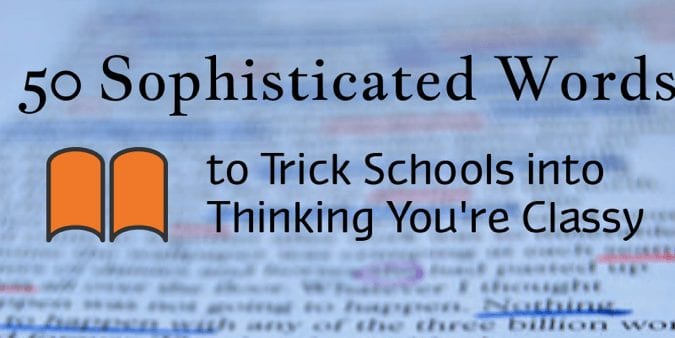

127 big fancy words to sound smart and boost your eloquence

Karolina Assi
Everyone wants to sound smart and come across as someone that can express their thoughts eloquently. And even though you might have this fantastic ability in your native language, you may feel limited doing this in English if you’re beginning your journey in expanding your vocabulary with unusual or rarer words.
Fortunately, the English language has thousands of big words that will make you sound instantly more eloquent and knowledgeable.
These words will help you express yourself in a more elegant way by substituting the basic, everyday words with their more fancy synonyms. Learning those “big” words in English is also a great way to impress those around you - whether it’s at school, at work, or during your next date.
To help you take your English vocabulary to the next level, we’re prepared a list of 120+ big words to sound smart, with their meaning and an example of how to use them in context.

The do’s and don'ts of using big words in English
Throwing in a few fancy words into your conversations or monologue is a good idea to sound more eloquent and impress everyone around you.
It’s also a great way to sound smart when you don’t know what to say on a specific topic but want to make a good impression and appear more knowledgeable than you are (like this English student during his literature class ).
But there’s a fine line between using fancy words that truly make you sound eloquent and those that make you sound like you’re trying too hard.
Sometimes, using big words to sound smart may backfire, especially if you don’t really know what they mean. Then, you may end up saying something that makes no sense and leaving everyone in the room perplexed. Plus, using complex words you don’t understand can make you sound pompous - so tread the line between careful and carefree.
Use them only if you truly understand their meaning and know what context to use them in. But don’t use them mindlessly as it will result in an opposite effect to what you intended.
Aside from learning those fancy words and their meaning, another challenge lies in their pronunciation. If you choose those big words that are also hard to pronounce , like “epitome” or “niche,” you might end up saying something that makes everyone laugh (it wouldn’t be such a bad scenario!).
The point is: if you’re going to use fancy words to sound smart, learn their meaning, understand how to use them in context, and practice their pronunciation first.
Big words to sound smart and their meaning
The smartest way of sounding more eloquent when expressing yourself in English is to change basic, everyday words for their fancier versions. For instance, instead of saying “very big,” say “massive.” Instead of saying “detailed.” say “granular,” and instead of saying “not interesting,” say “banal.”
See? Using the word “granular” in a sentence will inevitably add more elegance to your speech and make you appear more fluent and eloquent.
The words we’ve chosen to include in the tables below follow this exact principle. Most of them are just a fancier version of a basic, simple word you’d normally use. Others are words used in a professional or academic setting that simply add more articulacy to your statement.
Fancy words you can use at work
The question isn’t whether you should learn a couple of fancy words you can use at work to impress your boss and coworkers. The question is, how do you use them without coming across as a pompous know-it-all, irritating everyone around you?
Well, it’s all about using them wisely. Don’t cram 10 fancy words into a simple sentence just to sound smarter. Only use them when they help you get your message across. If they don’t bring any value to your sentence, simply don’t use them.
In other words - don’t force it! Be natural.
With that said, here are some big words you can use at work.
.jpeg)
Ready to further your career with a new language?
Get the language skills, cultural understanding and confidence to open up your world with Berlitz.
Clever words you might use academically
The academic setting does not only encourage you to sound smart. It forces you to. To get higher grades and convince your professors of your knowledge and eloquence, you need to elevate your vocabulary.
Whether it’s in written or spoken assignments, these words will help you express yourself in a more intelligent and elegant way while impressing your colleagues and professors.

Big interesting words you might use socially
Being the smartest person among your friends is surely a great boost for your ego. It can help you gain their approval, receive compliments, and maybe even get a date or two while hanging out at the bar with your friends.
But the other side of the coin is that using overly sophisticated words in a casual, social setting can make you appear pretentious and out of place. That’s why you need to be careful and not overdo it! If you do, you might only end up humiliating yourself, and that’s a terrible place to be in.
Here are 20+ big words in English you can use in social situations with their meaning and an example of a sentence you could say.

Impressive words you might use romantically
Even if you’re not a very romantic person, some occasions require a bit of romanticism. Using elegant words in your expressions of love and affection can make your romantic conversations and gestures more special and memorable.
Still, don’t use big words if you don’t mean them! You should always be sincere and genuine in your expressions. Remember that words hold tremendous power in inspiring emotions in those who receive them.
With that said, here are 30 big words you can use in a romantic setting to express your love and affection for your significant other or to take your relationship with the person you’re currently dating to the next level (congrats!).


Sophisticated words you might use when discussing art and literature
Are you an art or literature? These two areas often require eloquent vocabulary to describe them. At least, that is the sort of language that people expect to hear from someone who’s an avid reader and art connoisseur.
You might want to express how the allegory in that poem made you feel or the way the plot of the book has enthralled you to keep reading but lack the right words to do it. If so, here’s a list of 20+ words you can use to talk about art and literature in different contexts.

Fancy words you might use when talking about your hobbies
When talking about our hobbies, we want to come across as more knowledgeable than others. After all, they’re our special interests, and we naturally possess a greater deal of expertise in these areas.
Whether you’re into literature, movies, or sports, here are some fancy words you can use to describe your interests.

Make the Thesaurus your new best friend
In this article, we’ve only covered 126 big words. Understandably, we can’t include all the fancy words you might need in one article. There are simply too many!
But luckily, there’s a free online tool you can use to find the synonyms of everyday words to expand your vocabulary and make yourself sound smarter.
Can you take a guess?
That’s right - it’s the online Thesaurus . You’ve surely heard about it from your English teacher, but in case you haven’t, Thesaurus is a dictionary of synonyms and related concepts. It’s a great way to find synonyms of different words to spice up your oral or written statements and avoid repeating the same old boring words time and time again.
Choose your words wisely
Whether you’re using simple, everyday words in casual conversations or those big, fancy words in a professional or academic environment, remember one thing: words have power.
They’re spells that you cast (there’s a reason why it’s called “spelling”) onto yourself and those who you speak them to. The words you speak inspire emotions and shape how other people perceive you. But they also influence your own emotions and shape how you perceive yourself.
So choose them wisely.
Learn more about the fascinating English language on our English language blog here.
Related Articles

January 31, 2024
15 of the longest words in English and how to pronounce them

May 23, 2023
127 business English phrases for great business conversations

January 31, 2023
252 of the hardest English words to pronounce and spell
1-866-423-7548, find out more.
Fill in the form below and we’ll contact you to discuss your learning options and answer any questions you may have.
I have read the Terms of Use and Privacy Policy
- Privacy Policy
- Terms Of Use

50 Sophisticated Words to Trick Schools into Thinking You’re Classy

Find your degree
Many students are intimidated by the essays that must be written to complete college or scholarship applications. The truth is, you don’t have to use big words or fancy words you don’t understand to write a compelling essay — a few well-placed, sophisticated words will do. College essays should be extremely polished and fluff-free.

It’s time to get creative and make every word count, so be sure to use sophisticated words rather than slang or Internet acronyms (LMAO). Forget everything Urban Dictionary taught you and add a touch of class to your vocabulary with more sophisticated words in your writing and speech.
When you are ready to choose a school, we recommend you use our ranking of the top 100 best online colleges as your starting point.
- Advantageous (adjective) beneficial; creating a favorable situation to give an advantage. My volunteer work puts me in an advantageous position over other applicants.
- Alacrity (noun) pep in your step; lively, cheerful, and eager behavior. She lit up the dull room with her alacrity; her energy was palpable. She was thrilled to have been chosen to help.
- Amiable (adjective) friendly and good-natured. He was amiable and well-liked in the community prior to the discovery in his basement.
- Aptitude (noun) talent or ability She discovered her aptitude for real-life math at a young age while shopping with her mother.
- Assiduity (noun) dedication, diligence, and great focus. I studied with assiduity for the exam and feel confident and fully prepared.
- Candor (noun) open; honest; sincere. The senator’s candor during his speech won many voters over.
- Cumulative (adjective) accumulative, all added together. Exercising for one day may not yield results, but the health benefits are cumulative over time.
- Debase (verb) to corrupt or contaminate. I don’t allow mainstream media to debase my common sense.
- Deferential (adjective) yielding out of respect. The commissioner became accustomed to deferential treatment.
- Diligent (adjective) attention to detail; careful and hard-working. My diligent work on the project was critical to its success.
- Eloquent (adjective) fluent; having a way with words; perfectly said. Her eloquent speech moved the audience to tears.
- Elucidate (verb) to explain very clearly. She was eager to elucidate the problem to the mechanic so that it could be fixed.
- Emboldened (adjective) being made bold. We were emboldened by our success and ready to take it to the next level.
- Ephemeral (adjective) fleeting or short-lived. Summer romance is often ephemeral, as is the season itself.
- Equitable (adjective) a fair division between all parties. My equitable share of the profit was 45%.
- Extol (verb) to give high praise. He gave a speech to extol the benefits of online college .
- Gratuitous (adjective) unnecessary; uncalled-for. Both parties hurled gratuitous insults at each other and nothing was accomplished.
- Gregarious (adjective) outgoing; extroverted. The gregarious host made us feel welcome and comfortable in her home.
- Hypocrisy (noun) the insincerity of pretending to believe something you do not believe. My mother’s hypocrisy was exposed when I caught her cursing and smoking after speeding home from a late night out.
- Incisive (adjective) the ability to identify or draw sharp distinctions. Her incisive remarks were hurtful, mostly because they were pointedly accurate.
- Industrious (adjective) hard-working and persevering. In order to stand out from others, you must be smart, polite and industrious at your job.
- Innate (adjective) born with it. He has the innate ability to make people smile and uses it to his advantage.
- Insular (adjective) isolated; an island unto itself. Small-town life has many advantages, but can also be insular in many ways.
- Intrepid (adjective) Bold or brave. The intrepid explorer has seen things the rest of us can only imagine.
- Latent (adjective) there, but not there; having the potential to be realized, but hidden. Since the virus is latent there are no obvious signs of infection.
- Lithe (adjective) supple, bending easily. The dancers were lithe, yet also very strong.
- Maxim (noun) a widely known saying that is accepted as truth. Gandhi’s maxim “Be the change you wish to see in the world” is one to live by.
- Meticulous (adjective) precise attention to every detail. She is always meticulous about her research, leaving no stone unturned.
- Modicum (noun) a small token amount. We enjoyed only a modicum of success so far, but are optimistic about the next project.
- Myriad (noun) a large amount; countless. With online college , there are a myriad of career possibilities.
- Nuance (noun) a very subtle difference. The nuance of her voice added new dimensions to the song she covered.
- Obsequious (adjective) subservient; brown-nosing. His obsequious behavior failed to flatter his boss and quickly became annoying to everyone.
- Panacea (noun) a cure-all. Mom’s homemade chicken soup is the ultimate panacea.
- Pellucid (adjective) clearly understandable. The assembly instructions were surprisingly pellucid, which made the desk easy to put together.
- Penchant (noun) a strong preference or liking. He has a penchant for antique automobiles and frequently attends car shows.
- Perusal (noun) studying with the intent to memorize. A perusal of the material the night before made me feel confident about taking the test.
- Plethora (noun) an abundance or extreme excess. With the plethora of choices, making a decision about which car to buy came down to consumer reviews.
- Pragmatic (adjective) realistic and practical. Her pragmatic approach offered no frills but worked perfectly.
- Predilection (noun) a preference or bias. Her predilection for the color blue was evident in her wardrobe choices.
- Repudiate (verb) to reject or refuse to recognize as valid. He began to repudiate my excuse without even letting me finish.
- Salient (adjective) something that stands out and is obvious. There may be some advantages to buying in early, but they are not immediately salient.
- Staid (adjective) dignified and with decorum. I have lived a particularly staid life, so as not to embarrass myself.
- Studious (adjective) character trait involving diligent study. She was always quite studious; it was not uncommon to find her books lying about.
- Substantiate (verb) to give facts to support a claim. He said he was robbed, but there is nothing to substantiate his claim.
- Superfluous (adjective) in excess; more than is needed. Don’t waste your precious breath with superfluous flattery; it will get you nowhere.
- Surfeit (noun) the quality of overabundance. Considering the surfeit of food in America it is amazing that we still have some of our population go hungry.
- Sycophant (noun) someone who sucks up to others for personal gain. She often wondered if Bruce really liked her or if he was simply being a sycophant because of her wealthy parents.
- Taciturn (adjective) reserved or aloof. I tried to talk to my mother about what happened, but she remained taciturn.
- Venerable (adjective) honorable; highly regarded. I was nervous about performing on opening night because of all the venerable guests in attendance.
- Zenith (noun) the highest point. Looking back, Bradley realized that winning the tournament was the zenith of his high school career.
Visit Vocabulary.com for more sophisticated words to expand your vocabulary — and always keep it classy.

IMAGES
VIDEO
COMMENTS
Big words to sound smart and their meaning. The smartest way of sounding more eloquent when expressing yourself in English is to change basic, everyday words for their fancier versions. For instance, instead of saying “very big,” say “massive.”. Instead of saying “detailed.” say “granular,” and instead of saying “not ...
A list of 227 words by revengeance. Tip: Add several words or phrases at once by separating them with semicolons. Don't worry about surrounding whitespace -- we'll ignore it.